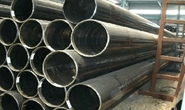Government/Policy

June 21, 2018
Pipeline Producers Seek Tariff Exclusions
Written by Sandy Williams
Major pipeline producers are seeking tariff exclusions for imported pipe used in pipeline projects currently in progress. Of the estimated 21,000 exclusion requests submitted to Commerce, more than 500 requests are for pipe and other energy-related materials.
A report released June 18 by the Interstate Natural Gas Association of America (INGAA) estimates 41,000 miles of oil and natural gas pipelines will be constructed from 2018 through 2035. More than 77 percent of steel used in line pipe is imported, either as finished pipes or as steel slabs to be formed in the United States, according to a 2017 study by ICF. Line pipe is made from hot rolled steel that has increased in price domestically by nearly 50 percent from a year ago.
Plains All American Pipeline is seeking exclusions for pipe it will soon receive from Greece for its 500-mile Cactus oil pipeline in Texas. According to Plains, only three mills in the world make pipe to the specifications required for the Plain’s line, none of which are in the United States.
Kinder Morgan has asked for a $1.75 billion exclusion for its Gulf Coast Express line that will run from West Texas to the Gulf. The company has already ordered 47 percent of the specified pipe it requires from Turkish steel maker Borusan Mannesmann. The only U.S. producer that could produce the type of pipe required was unable to supply enough for Kinder Morgan’s needs within its timeline.
Oil and gas producer Hess uses Japanese pipe for its Stampede offshore project in the Gulf of Mexico and cited safety as a reason for its exclusion request.
“Without the ability to use this product, we will not be able to guarantee corrosion resistance in deepwater operations using other currently available steel products, potentially compromising both safety and environmental protection,” the company wrote in its filing.
The American Petroleum Institute expressed its dismay that the European Union, Canada and Mexico were included in the Section 232 tariffs.
“We are deeply discouraged by the administration’s actions to impose tariffs on our three closest trading partners – Canada, Mexico, and the European Union – and view this as a step in the wrong direction,” said API President and CEO Jack Gerard on May 31. “The implementation of new tariffs will disrupt the U.S. oil and natural gas industry’s complex supply chain, compromising ongoing and future U.S. energy projects, which could weaken our national security.”
He added, “Increased prices in specialty steel could threaten the continued domestic production of oil and natural gas and natural gas liquids – which are at their highest levels of production since 1949 – and could raise energy costs for U.S. businesses and consumers, while threatening the nation’s ability to achieve President Trump’s goal of energy dominance.”
The oil and natural gas industry supports 10.3 million U.S. jobs and nearly 8 percent of the U.S. economy, according to API data. The new tariffs that the Trump administration is imposing on China imports will include parts and products used by the natural gas and oil industry. API says it is concerned about the detrimental effects it will have on the industry and on costs for U.S. consumers.
On June 15, the API president stated, “We have very vocally opposed the implementation of Section 232 tariffs under the guise of national security concerns, and we are now also troubled with the administration’s process around the implementation of Section 301 tariffs on China.
“The lack of transparency in the process, as well as the absence of consultation with the U.S. natural gas and oil industry to determine the potential impact on U.S. investments, jobs and consumers, is especially troubling. Section 301 tariffs, as well as the recently implemented Section 232 tariffs, will have a real impact on current and future U.S. energy projects, and could ultimately harm our energy renaissance, which provides high-paying jobs and affordable and reliable energy to Americans.”
In addition to tariffs, Goldman Sachs noted that oil prices dropped in the past few weeks due to weaker demand from emerging markets and rising inventories. Oil may have reached its peak pricing, according to some analysts, and is subject to volatility from political comments. Brent crude dropped 0.40 percent to $75.04 per barrel and WTI fell 1.25 percent to $64.87 per barrel following Trump’s announcement that he is considering an additional $200 million in tariffs on Chinese imports. The additional tariffs are in retaliation for China’s retaliation to Section 301 tariffs. China’s tariffs on U.S. imports include a 25 percent tax on U.S. crude oil, gas and coal.
The U.S. sends about $1 billion of oil to China per month—300,000 barrels per day and about 5 percent of China’s total crude imports.
And if that isn’t enough worries for the industry, Russia and OPEC are meeting to decide if they will reverse the oil production cuts agreed upon in 2016. The Russian energy minister and his Saudi counterpart said they would propose increasing production by 1.5 million barrels per day for the third quarter and then review the situation again in September. The Wall Street Journal reports, however, that OPEC members are discussing a smaller increase of 300,000 to 600,000 barrels per day.







